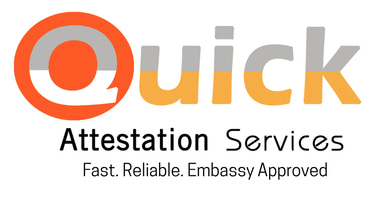Saudi Embassy Attestation Requirements Explained
Discover the essential requirements for Saudi embassy attestation of educational, personal, and commercial documents. Ensure your documents meet the necessary standards for a smooth attestation process.
10/3/20257 min read


Introduction to Saudi Embassy Attestation
Saudi embassy attestation refers to the official process of verifying documents by the Saudi Arabian embassy or consulate. This procedure is crucial for individuals and organizations intending to use educational, personal, or commercial documents within Saudi Arabia. The attestation process serves as a means to ensure that the documents presented are authentic and trustworthy, satisfying the legal requirements set by Saudi authorities.
The importance of Saudi embassy attestation cannot be overstated, especially in contexts such as education, where institutions often require proof of qualifications from foreign applicants. Universities and colleges may request the attestation of diplomas, transcripts, and other academic records to establish the legitimacy of an applicant's educational background. Without proper attestation, candidates may face challenges in gaining admission or receiving recognition for their degrees.
In business dealings, Saudi embassy attestation plays a vital role for foreign entities looking to operate or establish partnerships in the country. Companies must often present commercial documents such as contracts, invoices, and corporate certifications. The Saudi embassy verifies these documents to confirm their validity, enhancing the credibility of international transactions within the kingdom.
Furthermore, personal matters such as marriage, birth certificates, and divorce decrees may also necessitate Saudi embassy attestation. This ensures that such documents are recognized as valid within the legal framework of Saudi Arabia, which is especially important for expatriates and foreign residents.
Overall, the role of the Saudi embassy in verifying documents through attestation is fundamental in facilitating legal processes in various areas, catering to the requirements of education, business, and personal affairs. Understanding this process is essential for anyone needing to navigate legal documentation in Saudi Arabia.
Why Attestation is Necessary
Attestation serves as a critical process for the validation of documents intended for use in Saudi Arabia. This formal recognition is necessary to ensure that educational, personal, and commercial documents are deemed legitimate by the Saudi authorities. Without proper attestation, there is a significant risk that these documents could be rejected, leading to delays and complications in administrative processes.
One of the primary reasons attestation is essential is that it provides legal recognition of documents. When documents are attested, they acquire validity that is recognized by the government and institutions within Saudi Arabia. This is particularly important for educational certificates and professional qualifications, as many expatriates seek employment opportunities in the Kingdom. Employers often require verified documentation to confirm the educational backgrounds of potential employees. Therefore, attested documents facilitate smoother employment processes by reducing ambiguity over qualifications.
Additionally, the process of attestation serves as a deterrent against fraud. In a globalized world where counterfeit documents can easily circulate, attestation acts as a safeguard. It ensures that the documents are indeed issued by legitimate institutions and have not been tampered with. This level of scrutiny not only protects individuals but also upholds the integrity of the legal and administrative systems in Saudi Arabia.
On the other hand, the implications of using unverified documents can be severe. Submitting non-attested paperwork may lead to legal repercussions, including penalties or rejection of applications. Moreover, it can damage one's credibility, affecting opportunities for employment, education, or business dealings. In conclusion, the necessity of document attestation cannot be overstated, as it plays a pivotal role in ensuring the lawful recognition and credibility of essential documents in the Kingdom of Saudi Arabia.
Requirements for Educational Document Attestation
Attesting educational documents such as degrees, diplomas, and transcripts is a crucial process, particularly for individuals seeking employment or further education in Saudi Arabia. The first step in this process involves gathering the necessary paperwork. Typically, the primary documents required include the original educational certificate, valid identification (such as a passport or national ID), and possibly a copy of the previous attestation if applicable.
Once you have gathered the requisite documents, the next phase involves submitting them to the relevant authorities for attestation. This can often be initiated at an educational institution or a recognized governing body responsible for verifying educational qualifications in your home country. After initial clearance, the documents must be presented to the Saudi Arabian Embassy or Consulate that serves your region.
Additionally, applicants should be prepared to complete a request form available at the embassy, outlining the specific purpose behind the attestation. This could include employment, further education, or immigration purposes. Moreover, different fees apply based on the type of documents being attested, which can vary depending on the embassy’s policies. It is advisable to confirm the current fees via the official embassy website or by contacting their office directly.
To ensure a smooth processing experience, review all documents meticulously to avoid any discrepancies. It is also prudent to make copies of all submitted documents in case of queries or additional requests from the embassy. Lastly, processing times can fluctuate based on the embassy’s workload; hence, applying well in advance of any deadlines is advisable. With careful preparation, educational document attestation can be managed efficiently, facilitating your transition into Saudi Arabia for study or work opportunities.
Requirements for Personal Document Attestation
Attesting personal documents is a crucial step for individuals who need to validate their documents for various purposes, including immigration, employment, or legal matters in Saudi Arabia. The Saudi Embassy requires specific documents and adherence to a clearly defined process to facilitate the attestation of personal documents such as birth certificates, marriage certificates, and identity proofs.
First and foremost, it is essential to prepare the original document that requires attestation along with a set of clear photocopies. Birth certificates should be issued by a recognized authority, preferably translated into Arabic if the original is in another language. Marriage certificates must also be authentic and authenticated by the relevant authority in the home country. In cases where the applicant is seeking attestation of identity proofs, valid government-issued identification, such as passports or national identity cards, is mandatory.
Accompanying each document, a completed application form is required. This form typically includes personal details such as the applicant's name, contact information, and the purpose of attestation. Additionally, two recent passport-sized photographs of the applicant may be needed to complete the application process. Fees for the attestation service vary and are generally payable at the time of submission; it is wise to prepare the exact amount.
Once all required documents and fees are submitted, applicants must wait for processing, which can take several days, depending on the embassy's workload. It is advisable to keep track of the application status, as additional documentation may be requested by the embassy. Ensuring that all paperwork is in order can lead to a seamless attestation process and help facilitate the eventual use of these important personal documents in Saudi Arabia.
Requirements for Commercial Document Attestation
Attesting commercial documents is a critical process for businesses engaging with Saudi Arabia. The attestation process ensures that your documents are legally recognized and accepted in the country, thus facilitating smoother transactions and partnerships. To achieve this, certain requirements must be met for various types of business-related documents, which include contracts, partnership agreements, and invoices.
Initially, businesses need to gather all relevant documents that require attestation. This typically involves original documents along with copies that need to be duly signed and stamped by authorized personnel. For instance, contracts should be signed by all parties involved, while partnership agreements must clearly outline the terms of the business relationship. In the case of invoices, they must detail the nature of the transaction, parties involved, and pertinent financial information.
After compiling the necessary documents, businesses must ensure that they are certified by a recognized authority in their home country, such as a notary public or relevant government agency. This certification is pivotal as it verifies the authenticity of the documents before they are presented to the Saudi embassy. Additionally, businesses may need to provide a cover letter detailing the purpose of the attestation, along with identification documents of the signatories involved.
Moreover, businesses should be aware of specific guidelines set forth by the Saudi embassy for commercial document attestation. These guidelines may vary depending on the nature of the document being attested. It is likewise essential to consider any legal requirements or regulations within Saudi Arabia that may influence the acceptance of these documents. Therefore, consulting with a legal advisor or an attestation expert can be beneficial to ensure compliance with all applicable standards.
Common Challenges Faced During the Attestation Process
The attestation process for documents at the Saudi embassy can present various challenges to individuals seeking authentication for educational, personal, or commercial documents. One prevalent issue is miscommunication between the applicants and embassy officials. Many applicants lack clarity on the specific requirements for attestation, which can lead to confusion and delays. To mitigate this challenge, it is crucial for individuals to thoroughly review the guidelines provided by the embassy, ensuring they understand the requirements and the necessary documentation to submit.
Another significant challenge faced during the attestation process is the submission of incomplete documentation. Each document must meet specific criteria, and any missing paperwork can result in a rejection or a delay in processing. To avoid such setbacks, applicants should assemble all required documents well in advance. This includes notarized copies, translations if applicable, and any supporting materials specified by the embassy. Maintaining an organized checklist can help ensure that no essential paperwork is overlooked.
Delays in the attestation process are also common and can be frustrating for individuals who have urgent timelines, such as those applying for jobs or further education. These delays could arise from a high volume of applications or an unforeseen backlog at the embassy. To minimize wait times, applicants should consider scheduling their visits during off-peak hours, following up on their application status, and being patient throughout the processing period.
In conclusion, navigating the attestation process at the Saudi embassy can be challenging, but with proper preparation, understanding of requirements, and proactive communication, individuals can successfully manage these issues. Following best practices will not only streamline the process but also ensure the timely and efficient obtaining of authenticated documents.
Conclusion and Key Takeaways
Understanding the Saudi Embassy attestation process is crucial for individuals and businesses engaging with documents intended for use in Saudi Arabia. The attestation serves as a verification method that confirms the authenticity of educational, personal, and commercial documents, ensuring that they comply with the legal and regulatory framework of the Kingdom. Each document category—educational, personal, and commercial—has specific requirements that must be meticulously followed to avoid delays and complications.
For educational documents, it is essential to ensure that these credentials are verified by relevant educational authorities before submission to the Saudi Embassy. Similarly, personal documents such as marriage certificates or birth certificates also require authentication from appropriate state or local departments prior to their attestation. On the other hand, commercial documents face unique standards that involve verification from chambers of commerce or other regulatory bodies to meet the Kingdom's trade requirements.
As emphasized throughout the discussion, preparing documents adequately cannot be overstated. It is recommended that individuals double-check the specific requirements of their respective documents prior to initiation of the attestation process. Any oversight or lack of due diligence could lead to additional hurdles in validation or potential rejection by the embassy. Furthermore, seeking professional assistance or guidance can offer valuable insights and support to navigate this intricate process efficiently.
In conclusion, a thorough understanding of the Saudi Embassy attestation requirements, as well as the vigilance in preparing documents, can significantly enhance the likelihood of a smooth attestation process. For anyone looking to validate their documents for use in Saudi Arabia, being informed and prepared is paramount. Emphasizing this approach will streamline your experience and ensure compliance with all necessary regulations.
